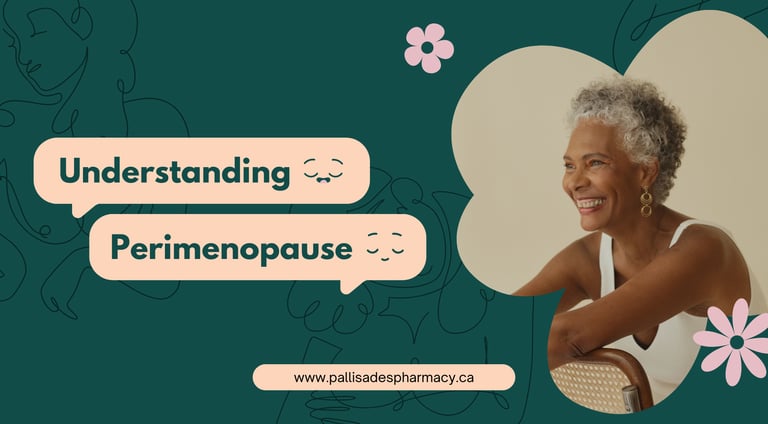What is it like to be perimenopausal?
Support your fellow perimenopausal woman by understanding what she is going through
PERIMENOPAUSEMENOPAUSEMENTAL HEALTH
Linda Nghiem | Pharmacist
8/7/20244 min read


What is the perimenopause transition?
Women entering their mid-life will go through the perimenopause transition and live possibly up to half their lives in post-menopause. The perimenopause transition are the years before their last menstrual period and includes one year after that last cycle. This is the time of life when women's bodies are changing, and few people really understand how and why.
Many women's complaints are brushed off as this is a normal progression of life, which it is. So is osteoarthritis, hearing loss and cataracts. We treat those conditions with anti-inflammatories, hearing aids and cataract surgery. We need to be understanding and support women in perimenopause, but how can you feel empathetic when you don't know what they are going through.
A glimpse into the symptoms of perimenopause
What does a hot flash feel like? You may be going about your day normally, doing what you always do. All of a sudden, you are unbearably hot. It feels like it is 40degC. Your face is flushed, and you start sweating bullets. Of course, you have to remove your top layer of clothes, because the first line of advice is to dress in layers. Maybe you start to worry about how sweaty you look while everyone else in the room is complaining how the air conditioning is too cold. After a few minutes of fanning and wiping away the sweat, the heat starts to subside. Take a deep breath and now you can start to get back to what you were doing.
Think of this happening a few times a day. How about a couple dozen times a day? It feels like a toddler is playing with your internal thermostat and there is nothing you can do but dress in layers. This is supposed to be normal for years of your mid-life... Really?
Every adult has heard of PMS before. The cranky moody few days (or weeks) before a woman gets her period. Just leave her alone, she's PMS-ing. The fluctuations of hormones in a woman's cycle can make her go crazy for a few days. Well, think of it happening EVERY DAY for a few years. Progesterone levels are naturally lower as a woman ages and then estrogen levels are up-and-down from a set of ovaries about to "set to expire" anytime, just not soon enough. One moment, you may feel normal and in control. The next, irritation and anger sets in. And then suddenly, you want to cry and you struggle to keep the tears from falling. No amount of reasoning can prevent these fluctuations in mood from happening. Why can't you just calmly deal with the situation, like you have in the past? The guilt can be overwhelming because you feel like you're failing as a mom, as a spouse, as a co-worker, and as a person.
Maybe it would help if you could sleep a bit better. Well, it is natural that people don't sleep as deep as they get older. So it is expected that you might wake up needing to pee, but not necessarily soaked in sweat because of that night sweat (essentially, a hot flash at night). Now you need to change your clothes and calm your annoyance from this rude awakening from your dysfunctional thermostat so that you can maybe fall back asleep again. The worry of the next day starts creeping in and you resist getting out of bed to just get your day started in the middle of the night.
The lack of sleep sure does not help with helping you focus on the task at hand. Your memory and concentration is poor, and you're just not as sharp as you used to be. Am you going through dementia? Lets exercise more since it is shown to reduce the risk of dementia, not to mention you need to shed the extra pounds gained despite doing your best efforts to eat healthily.
What about the stuff that women rarely discuss, like the fact that they have no idea when their going to have their next period, which tends to be heavier and more painful. Or the fact that it hurts to have sex, if they even want to have sex anymore. They leak a bit of pee with sneezes or coughs. They might have gotten a bladder infection for the first time in their lives. Wrinkles are showing up everywhere and no amount of serum or moisturizer is helping. The hair on their head is falling out, but hair is showing up on their upper lip and chin.
This has been going on for months, and you see your doctor to see if there's anything that can be done. Maybe they say it is because your in perimenopause. This is normal for your age. You'll have to deal with it and it should get better once you hit menopause. When does that happen? It might be 3-5 years or more. What can you give? Maybe some sleeping pills or an antidepressant for your unstable mood. Well, what about those hormones? Well, they might cause breast cancer and I don't know about hormones well enough to prescribe them. I can refer you to the menopause clinic but it is an 18 month wait before you get in. Help!
How do you support the women in your life going through the perimenopausal transition?
As a friend or family member, ask them how you can help them. Women at this age are juggling their duties as a daughter to their aging parents, as a mother to their teenaged children, as a employee furthering their career, while trying to find time for themselves. You cannot make the hot flashes go away or stabilize their hormones, but you can help her through the process. Be understanding when she is having a meltdown. Be patient when she can't remember what she was saying or doing. Lift the mood when she is upset. Remind her to take time to meet with friends. Take a leisurely stroll with her. Tell her she looks beautiful.
To the health care professionals, please learn more about perimenopause and hormones. I know it is complex. I know the evidence is confusing. Do your patients a service and try to understand what they are going through and have some empathy. They do not feel normal. They do not feel well. Help them feel better. This is what I did. I learned more about menopause. I learned about CBT for insomnia and hot flashes. To better answer the many questions that women had, I became a Menopause Society Certified Practitioner to help guide women through this transition. You can do some more learning and support these women too.
If you're ready to take control of your own perimenopause journey, contact me to set up a consultation. Together we can create a plan to help you down the path to feeling better.
Monday - Thursday: 9:00 AM to 5:30 PM
Friday: 9:00 AM to 5:00 PM
Saturday: 10:00 AM to 2:00 PM
© 2025. All rights reserved.
